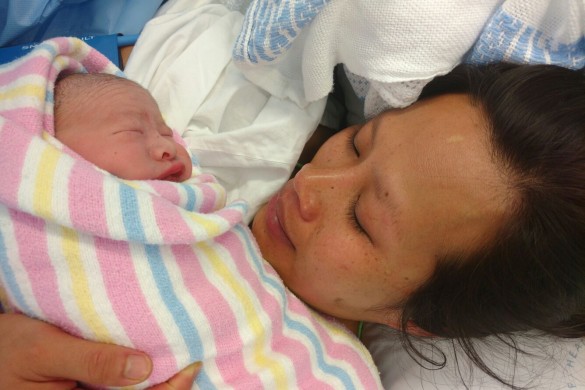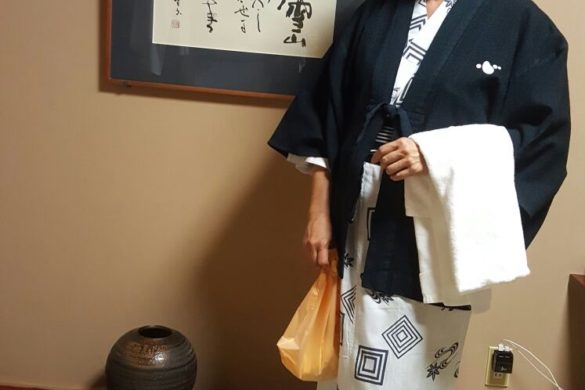An Australian woman offered to support her Chinese daughter-in-law after birth in the former’s home, only to find out that the new mum expected to pampered with special foods, complete bedrest, all because of the custom of zuoyuexi, literally translated as sitting out the month.
On the other hand, young mums with westernized life-styles experience conflict, struggling to integrate modern values and traditional Chinese practices insisted upon by fierce Chinese grandmas!
Confinement …. or Guantanomo?
Many cultures stipulate a month or 40 days of rest for mums after having a baby. There’s a lot written about the Chinese custom of zuoyuexi.. Taboos during this period include staying indoors after giving birth, avoiding getting wet (not washing hair and certainly not bathing), avoiding cold beverages, certain vegetables and fruits … the list goes on.
The result of NOT following these restrictions? Fengshibing, or wind-wetness sickness. Hah, not immediately but “watch out when you are 50 years old and have crippling arthritis and chronic ill-health” was the answer from my own mum.
Traditional postpartum custom persists in China, Taiwan, southeast Asia and many other places for Chinese immigrants including Australia, the US, and UK. Numerous studies find that confinement practices are strong even amongst second or third generation immigrant Chinese. Conflict can arise over this practice as the stories later illustrate.
What is this custom?
Originating over 2000 years ago in Northwestern China, in a cold and hostile environment where mothers and their babies were quarantined from communicable disease, confinement starts when the baby is born and ends with the celebration of the baby’s first month.
The roots of confinement practices are in the belief system of yin (negative or cooling) and yang (positive or warm) properties in our bodies that need to be balanced. Childbirth is considered a huge impact on a woman’s body (we’d agree on this I’m sure) upsetting the balance as a large amount of yang energy has been lost during labour.
So? There are 3 main categories of rituals –
- Dietary – Eating a balanced yin/yang diet
- Hygiene – Avoiding catching a cold, bathing and washing your hair
- Social – Resting and stay indoors. Avoiding too many visitors.
What does the science say?
Surprisingly, there is a lot of research on this subject. Most journal articles are related to whether or not confinement practices bear any relation to postpartum depression. I will review and summarise these in a separate post.
Based on a study in Fujian, China an international team of researchers evaluated Chinese confinement rituals to Western medical standards (Raven and 3 others, 2007) and I shall be referring to this in more detail.
What are the benefits?
As expected, most women report that having a rest from housework to be the best part of confinement. A few Western bloggers who set out to criticise confinement rituals find themselves converts noting increased support for new mothers.
Besides grandmothers, support comes in two main forms –
- confinement nannies (pui yuet in Cantonese, meaning to be a companion for a month) who look after the needs of new mums and their babies in their own homes
- luxury confinement centres in China, Hong Kong and Taiwan. One magazine reports that “mommy hotels” exist in the U.S., though they’re “underground, often only advertised in Chinese-language newspapers and television programs.” Intriguing!
My brother, living in Kuala Lumpur, expected me to hire a pui yuet for Faith, my daughter living in Sydney. Friends of his had done so. Faced with the prospect of tracking down someone with proper credentials, making sure that person was available in case the baby came early, and visa problems with the Australian immigration officials, I didn’t even discuss this with Faith. “Heartless” was the judgement that my brother passed on me!
Back to Raven and other’s research published in 2007, eating protein-rich hot food was found to be beneficial, as was avoiding housework! Many other practices such as staying indoors, avoiding “cold” as in yin food had no beneficial health effects based on a Western health model.
What are the negatives?
Taken to extremes, deaths occur. The New York Times in October 2015 reported that a woman died of a heatstroke in Shanghai after wrapping herself in blankets and refusing to use airconditioning. Tragic.
Middle kingdom, middle way: can we adapt cultural practices?
Over 36 years ago, with my first baby I had all the comforts and little distress during confinement. I resisted my mother’s suggestions of not showering or washing my hair.
“You must be joking Mum? No showing in equatorial Kuala Lumpur?” Ever practical, she backed off, but insisted that I bathed in a concoction of water boiled with herbs. That happened once. I also really liked the confinement foods – lots of ginger, chicken, wine – who could resist? Not going out? No problem, I stayed indoors, read, listened to music, bonded with my cute baby and received visitors.
With my second child in Sydney, my mother-in-law visited for several months. She was well-versed in Chinese customs but did not insist on traditional confinement practices and I was absolutely grateful for her help.
It is about the “spirit” of zuoyuezi and not the letter of the law. Aim to provide help to enable the new mum to rest, maintain a healthy diet and properly feed and care for baby.
From my own recent experience with my daughter, there was simply no question of enforcing outdated hygiene practices. Social limitations were observed for about 10 days in the sense that she did not venture out but she had many visitors. It was the dietary rituals that were practised. One of the traditional foods that I cooked was Black vinegar, ginger pork and that went down well. Click on this link for the recipe to this nourishing stew.
I cooked herbal soups and traditional food for 2 weeks (check the recipes section for more ideas) after which she said “mum, too much rice”, so the menu became more varied. Even so, after 3 weeks she announced she did not need any further help, so the confinement was cut short. I can report we are still talking …
What other confinement customs are there?
There’s lots of traditional knowledge on herbs, some really interesting stories on other confinement practices in other cultures and I shall try and find out more.












5 comments
[…] by many Asian cultures, the 40 day confinement period for postpartum or new mums is becoming better known, with a recent national radio program […]
[…] a Jewish princess”, so here it is! Chicken with mushrooms and sesame oil is a traditional Chinese confinement dish and a favourite of mine. There’s no reason why you can’t add the recipe to your every-day […]
[…] been a year since I helped my daughter Faith with her confinement, a period of rest after having her baby. Back in Sydney to celebrate Felix’s first birthday, I […]
I’m looking for a pui yuet in Sydney, are you aware of any services?
Hello Erika, so sorry I don’ know of any. Hope your confinement goes well!